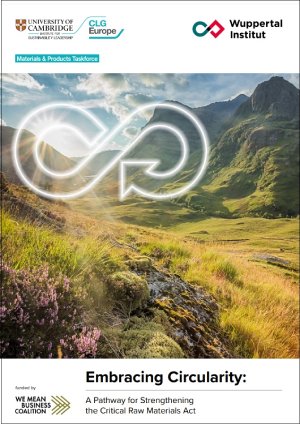17 July 2023 - CLG Europe’s Materials & Products Taskforce has released a new report in partnership with the Wuppertal Institute on the importance of better integrating circularity in the EU’s Critical Raw Materials Act.
This study focuses on the key role the circular economy could play in the EU’s Critical Raw Materials Act (CRMA). It draws from a diverse range of business perspectives regarding the challenges and opportunities of implementing a circular economy for CRMs. The purpose of the report is to underline how circular economy solutions could strengthen the security of supply of CRMs and accelerate the transition to a more sustainable European economy.
The report aims to:
- Improve the understanding of businesses and policymakers about the current and future demand for CRMs and strategic raw materials in Europe, and how greater circular practices could support the green transition, bolster geopolitical autonomy and enable business innovation.
- Improve the understanding of businesses and policymakers about the key barriers to greater circularity concerning CRMs.
- Set out what policies and investments are required to make a more circular approach work in practice, and what preconditions would be needed to facilitate and incentivise their effective use
The report is based on an extensive literature review, a stakeholder workshop and additional interviews with business representatives. The report features several business case studies to showcase the opportunities and how challenges can be overcome.
Business benefits of circular economy solutions include:
- Supply risk mitigation
- Technology risk mitigation
- Costs reduction
- New solutions
- Environmental, social and governance (ESG) performance
- New markets and business lines
The report provides recommendations on how policymakers could enable the faster uptake of circular economy solutions:
- Implement a more comprehensive circular approach within the CRMA, rather than focusing only on recycling.
- Set a flexible approach towards circularity within the CRMA that recognises the need for a case-by-case approach.
- Deploy forward-looking infrastructure to enable a systems-wide circular economy.
- Set a clear overall vision on a European Industrial Strategy that combines circularity, carbon neutrality and further sustainability aspects.
- Create more environmentally and socially sustainable supply chains by diversifying supply chains and promoting responsible mining practices.
- Implement financial incentives and support schemes to ensure faster the commercial viability of a shift towards green technologies.





